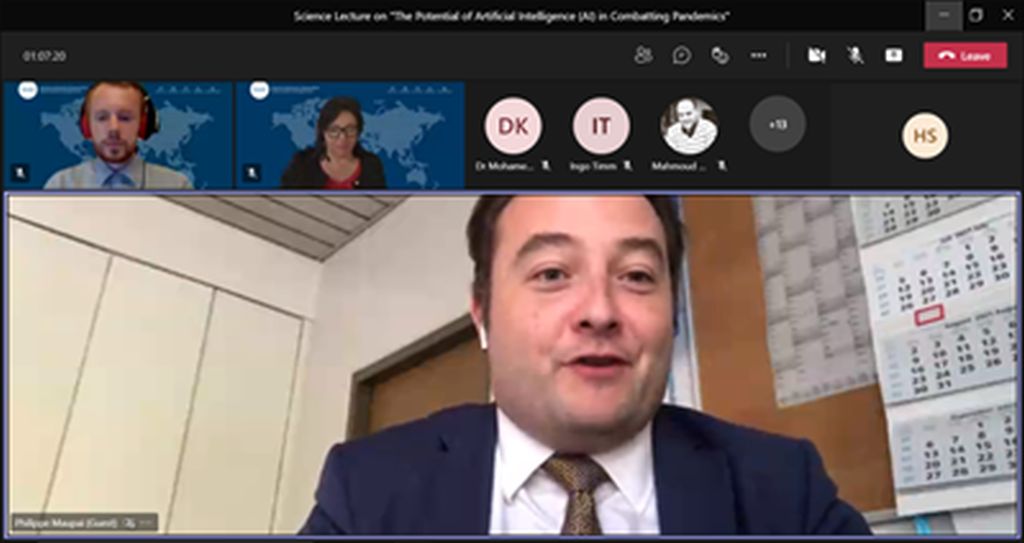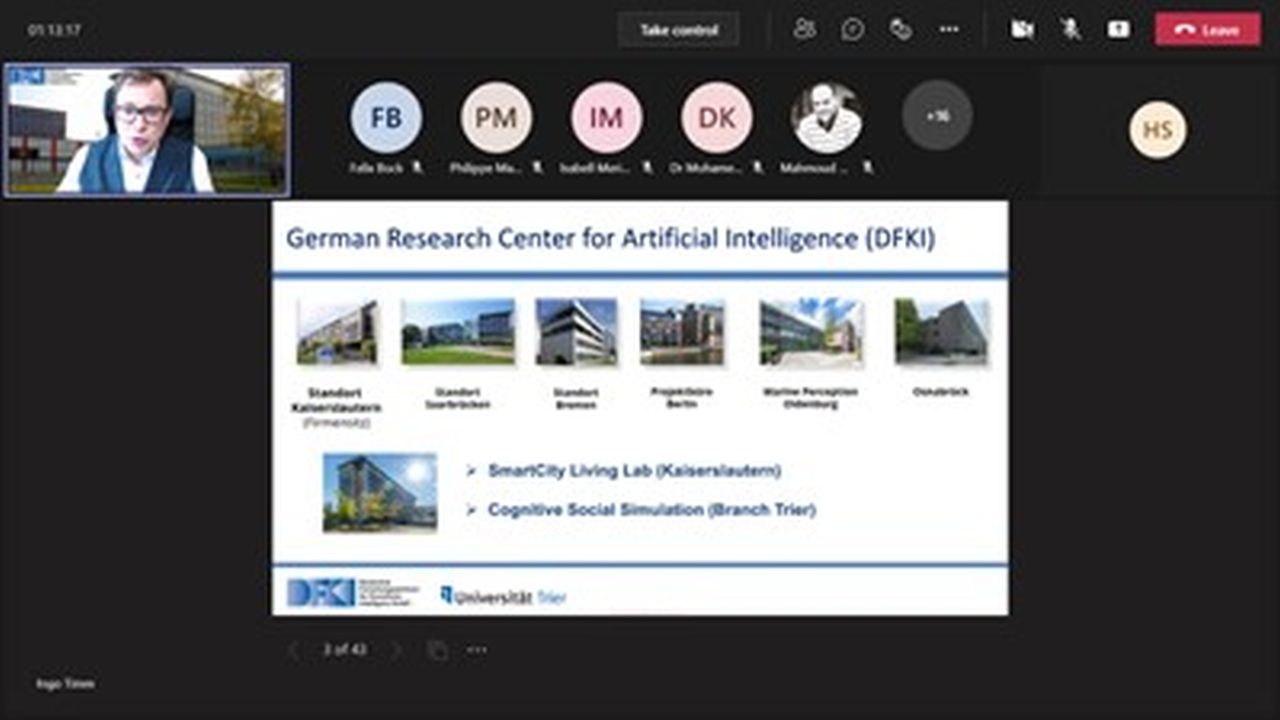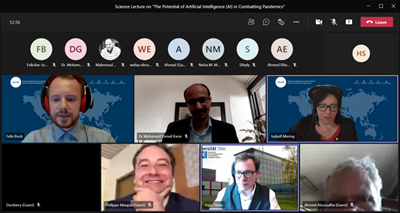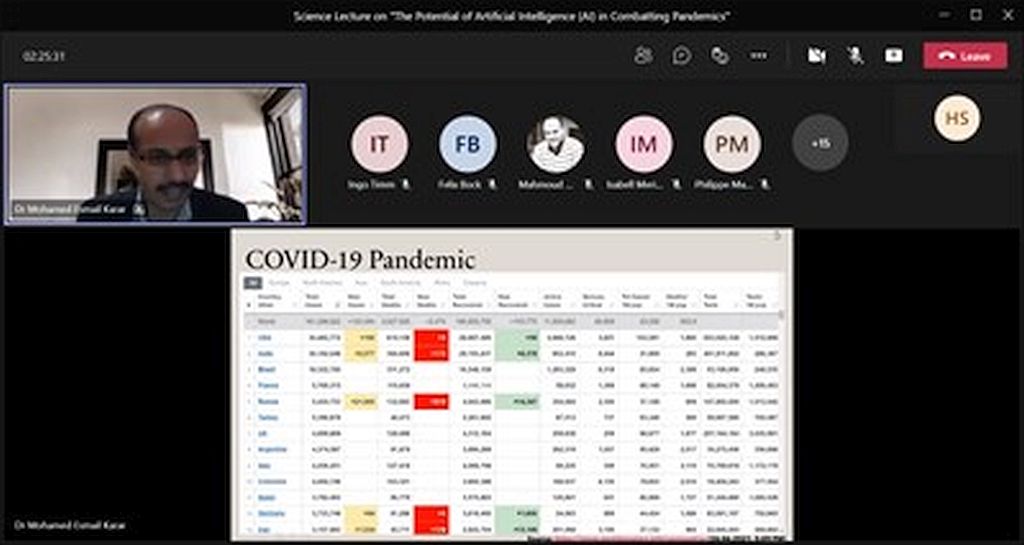Science Lecture on “The Potential of Artificial Intelligence (AI) in Combatting Pandemics”

Artificial Intelligence (AI) is more than ever in the focus of research and politics. AI applications serve in many areas such as commerce, virtual assistance or social media. With the spread of Covid-19, also and particularly health care issues are based on AI solutions: Even before the Covid-19 crisis, AI-based technologies have been used for a wide range of medical purposes, e.g. automatic diagnoses of illnesses. Scientists in the field of AI discovered as well its potential as a countermeasure against Covid-19 early at the beginning of the pandemic, pointing at the apparent need for enhanced research and development in this field.
By inviting a high-profile German and an Egyptian speaker from related professional fields, the Science Lecture provided relevant insights into the scientific field, a platform for international exchange and it also offered important impulses for potential German-Egyptian collaboration. Additionally, the event enabled a glimpse into the legislative framework with regard to AI research and presented prospects for its future development in both countries.

© DAAD
Ms. Isabell Mering, Director of the DAAD Regional Office Cairo, introduced the Science Lecture by bridging the current need for developed AI-systems and its relevance in combatting pandemics. The Head of Science and Protocol at the German Embassy in Cairo, Mr. Philippe Maupai, confirmed this observation and offered insights into the current agenda of German governmental bodies in terms of research and development in the field. He underlined that the German government had raised subsidies in 2020 for the national “KI-Strategie” (AI strategy) by 2 billion Euros, arriving at a total amount of 5 billion Euros to be contributed to Germany-based AI research.
Prof. Dr.-Ing. Ingo J. Timm, professor for business informatics at Trier University, gave an overview on the theoretical background on Germany’s AI strategy with an insight into its practical realisation. In his position as team leader at the German Research Center for Artificial Intelligence (DFKI), he supervises various projects in the framework of AI-based countermeasures against Covid-19. He presented one of these projects in his lecture titled “SoSAD – Evaluating Measures against the Spread of Covid-19 using Cognitive Social Simulation”. Starting off with the benefits that AI can deliver to industry, health care and crisis management, Prof. Dr. Timm then advanced to a detailed description of his project at the DFKI “SoSAD – Social Simulation for Analysis of Infectious Disease Control”: He explained that it serves as a tool to simulate the effects that different countermeasures – such as the closing of public institutions – will have on the spread of Covid-19. Prof. Timm states that the conclusions drawn from these virtual simulations can and should be included into the decision-making of political stakeholders.

© DAAD

© DAAD
In line with the statements posed by Prof. Dr. Timm, the second presentation offered by Assoc. Prof. Dr Mohamed Esmail Karar dealt with the “Prospects for the development of AI-based pandemic management in Egypt”. Prof. Dr Karar first examined general characteristics of pandemics with a focus on the current Covid-19 outbreak as well as the various purposes that AI can fulfil in health care, before he proceeded to the legislative and developmental framework of AI research in Egypt. The country is ranked first in the number of published papers and the conduction of clinical trials with regard to Covid-19 in Africa as well as the Middle East, proving the strong will that national decision-makers have in combatting the virus, that is further underlined by the launching of two emergency research calls in 2020 by the Science, Technology and Development Fund (STDF) to submit proposals that target the Covid-19 pandemic, with a potential support of 3-10 million EGP per project. Currently, Egyptian AI technologies applied in combatting the pandemic are focusing on the diagnostic field which receives large attention by the Egyptian research community. Furthermore, Prof. Dr Karar emphasized the pressing need for national and international collaboration in order to further develop adequate measures to combat pandemics like the current one.

© DAAD

© DAAD
With the DAAD Egypt’s Science Lecture 2021 on “The Potential of Artificial Intelligence (AI) in Combating Pandemics”, an innovative topic in science and research was successfully presented to the scientific community as well as to the interested public in Egypt. At the same time, the event served as a platform to support and foster the active and continuously growing scientific German-Egyptian network.

















